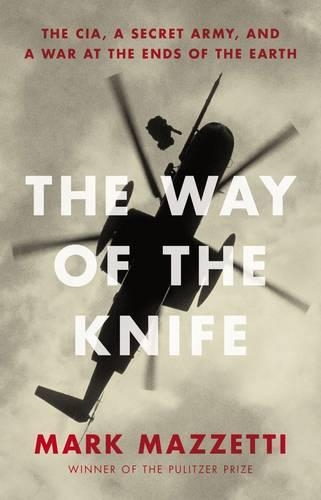
The Way of the Knife: The CIA, a Secret Army, and a War at the Ends of the Earth
(Paperback)
Available Formats
Publishing Details
The Way of the Knife: The CIA, a Secret Army, and a War at the Ends of the Earth
By (Author) Mark Mazzetti
Scribe Publications
Scribe Publications
24th July 2013
Australia
Classifications
General
Non Fiction
356.160973
Physical Properties
Paperback
400
Width 136mm, Height 208mm, Spine 29mm
394g
Description
A Pulitzer Prize - winning reporter's riveting account of the transformation of the CIA and America's special operations forces into man-hunting and killing machines. The most momentous change in American warfare over the past decade has taken place away from the battlefields of Afghanistan and Iraq, in the corners of the world where large armies can't go. The Way of the Knife tells the previously untold story of that shadow war- a campaign that has blurred the lines between soldiers and spies and lowered the bar for waging war across the globe. America has pursued its enemies with killer drones and special operations troops; trained privateers for assassination missions and used them to set up clandestine spying networks; and relied on mercurial dictators, untrustworthy foreign intelligence services, and proxy armies. Washington has embraced this new approach to war as a lower-risk, lower-cost alternative to the messy wars of occupation, championing it as a clean and surgical way of conflict. But the knife has created enemies just as it has killed them. It has fomented resentments among allies, fueled instability, and created new weapons, unbound by the normal rules of accountability during wartime. Mark Mazzetti tracks an astonishing cast of characters on the ground in the shadow war, and reveals how two proud and rival entities, the CIA and teh American military, are elbowing each other for supremacy. The CIA, created as a Cold War espionage service, is now more than ever a paramilitary agency ordered by the White House to kill off America's enemies - in the mountains of Pakistan and the deserts of Yemen, in the tumultuous civil wars of North Africa and the chaos of Somalia. For its part, the Pentagon has become more like the CIA, dramatically expanding spying missions everywhere. Sometimes, as with the raid that killed Osama bin Laden, their efforts have been perfectly coordinated. At other times, including in the failed operations disclosed here for the first time, they have not. For better or worse, their struggles will define American national security in the years to come. 'The story of how the CIA got back into the killing business is as chilling and dramatic as a spy novel - except it's true.' Dexter Filkins
Reviews
"The New York Times" "Superb...the best account yet." "Foreign Policy" "[An] indispensable CIA history." "The Hindu" (India): "[A] masterpiece." Dexter Filkins, author of The Forever War" "The story of how the CIA got back into the killing business is as chilling and dramatic as a spy novel--except it's true. Mark Mazzetti has laid out an extraordinary tale, tracking the spies as they track the terrorists. "The Way of the Knife "is as close as you'll ever get to the real thing." Jane Mayer, staff writer, The New Yorker"; author of The Dark Side: The Inside Story of How the War on Terror Turned Into a War on American Ideals" ""The Way of the Knife "provides a stunning, inside account of the CIA's transformation after 9/11 from an intelligence agency into a global clandestine killing machine. Mazzetti, who is one of America's best national security reporters, has written a frightening, must-read book." Thomas E. Ricks, author of Fiasco" and The Generals" "The United States fought three wars after 9/11: Iraq, Afghanistan and the one in the shadows. This is an authoritative account of that that third war, conducted by the CIA and military Special Operators in Yemen, East Africa and, most of all, Pakistan. If you want to understand the world we live in, you need to read it." "The Week" "The definitive history of how the intelligence agency became something much more like a paramilitary wing--de-evolving, in a sense, back to the days when the agency's adventurism influenced foreign policy around the world. It's a fascinating expose of what information the U.S. was not collecting--and how an attempt to fill the gap fell through oversight mechanisms and complicated geopolitics in Pakistan." "San Francisco Chronicle" "A highly engaging account that should please the curious and experts alike. Mazzetti manages to give a fresh reading to such oft-told stories as the bureaucratic jousting a
Author Bio
Authors Bio, not available
